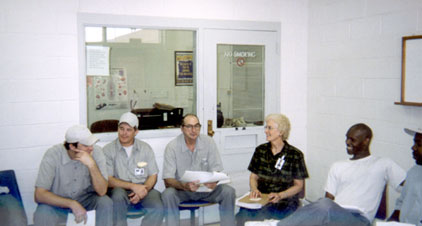 Peace of Mind is Brought to Inmates
Peace of Mind is Brought to Inmates
Working as a staff psychologist in a medium security prison is not what Carolyn Ekenstam, Ph.D. in Clinical Psychology, would have thought she would end up doing after completing training for her second career five years ago. And yet, here she is, four years into serving one of the most challenging underserved populations in America as a National Health Service Corps (NHSC) Loan Repayor.
Dr. Ekenstam represents an exact match for the NHSC in their search for the best clinicians to carry out their mission to improve the health of the Nation's underserved and uninsured. On a daily basis, she comes face-to-face with prisoners, staff, and people in crisis. Each encounter becomes an opportunity to deliver her personal best. And within each individual, Dr. Ekenstam looks for that unique spark that, if nurtured, will lead her patient to freedom from the imprisonment of spirit, and a full and better life.
Born in Wichita, Kansas, and raised in Texas by a minister father and a teacher mother, one would have thought helping people, and especially those less fortunate, would be a natural path for Dr. Ekenstam to follow. However, after earning a Bachelor of Science in Chemistry in 1966, she chose instead to work in a laboratory and turn her considerable people skills toward raising a family. With family almost grown and gone, Ekenstam's interest as a psychologist came from a personal tragedy and was nurtured by her involvement as a volunteer with a program that matched mentally challenged children with caring friends in her community. Dr. Ekenstam decided to go back to school in 1990 to satisfy her budding interest. Eight years later, she became a clinical psychologist.
 Shortly after obtaining her license in 1998, Dr. Ekenstam spotted a newspaper ad for a staff psychologist at Dick Conner Correctional Center, an extension of the Oklahoma Department of Corrections. She applied for the position and was accepted. Three years later, a friend told her about the NHSC Loan Repayment program. To see if she could get monetary assistance, Dr. Ekenstam applied and secured loan repayment starting July 2002.
Shortly after obtaining her license in 1998, Dr. Ekenstam spotted a newspaper ad for a staff psychologist at Dick Conner Correctional Center, an extension of the Oklahoma Department of Corrections. She applied for the position and was accepted. Three years later, a friend told her about the NHSC Loan Repayment program. To see if she could get monetary assistance, Dr. Ekenstam applied and secured loan repayment starting July 2002.
Now a 57-year old powerhouse, "probably the oldest NHSC Loan Repayor on record," she quips, Dr. Ekenstam shares her time and creativity between crisis intervention, group, and individual therapy, with a little substance abuse counseling thrown in for good measure. The biggest issue facing any prison psychologist is one of trust. And the problem isn't exclusive to the inmate population. For Dr. Ekenstam, her services are also extended to the prison staff, administration, prison culture, and the prison system itself. All demand the attention and treatment of the clinician, and all must function in synergy if any one element is to flourish.
Dick Conner Correctional Center, located in Hominy, Oklahoma, is a medium security institution that also produces manufactured goods ranging from license plates to hospital garments, to the tune of over $1.6 million in sales a year. The prison population of 1,226 is exclusively male, with an almost 50-50 split between violent and non-violent offenders. Fifty-four percent of the inmates are White, 33 percent are African-American, and seven percent are American Indian. Regardless of her own background, Dr. Ekenstam brings to each patient an open and accepting mind, a sensitivity to the all the factors which have brought him to prison and to her office, and a profound respect for who he is at this point and who he would like to be.
"Prison psychologists often walk a thin line between keeping the confidence of a patient, and ensuring the safety and security of the individual and the institution," she readily admits. "Trust is something you earn, patient by patient, and without trust, there is no treatment. Word gets around. You can rise or fall on that word."
The word from Dick Conner is that Dr. Ekenstam is indeed someone who can be trusted and someone who listens without being judgmental.
To Dr. Ekenstam, treating her patients is both an art and a science. "In some situations, you can go by the book, while in others you find that your gut tells you that something is wrong." To emphasize the point, she relates how she anguished over a patient who was being transferred to another facility. Her gut told her that he had not come as far as even he thought he had. Acting on instinct, she alerted the health care staff at his destination to keep an eye on him and be on the lookout for trouble. Her vigilance paid off, saving prison staff from a potentially dangerous situation and the prisoner from a lengthy stay on an isolation unit.
For the NHSC, supporting this strong woman in her second career choice has paid off immeasurably in countless lives retrieved from crime and unknown other lives saved. But the best accolade for their choice comes from the heart of one of Dr. Ekenstam's successes: "I'm not at all sure I would have made it through the depression and anxiety had you not been there. You did more than simply 'your job'. And because of your acceptance, you reached me and probably saved me-from myself."
Learn about other NHSC success stories.

